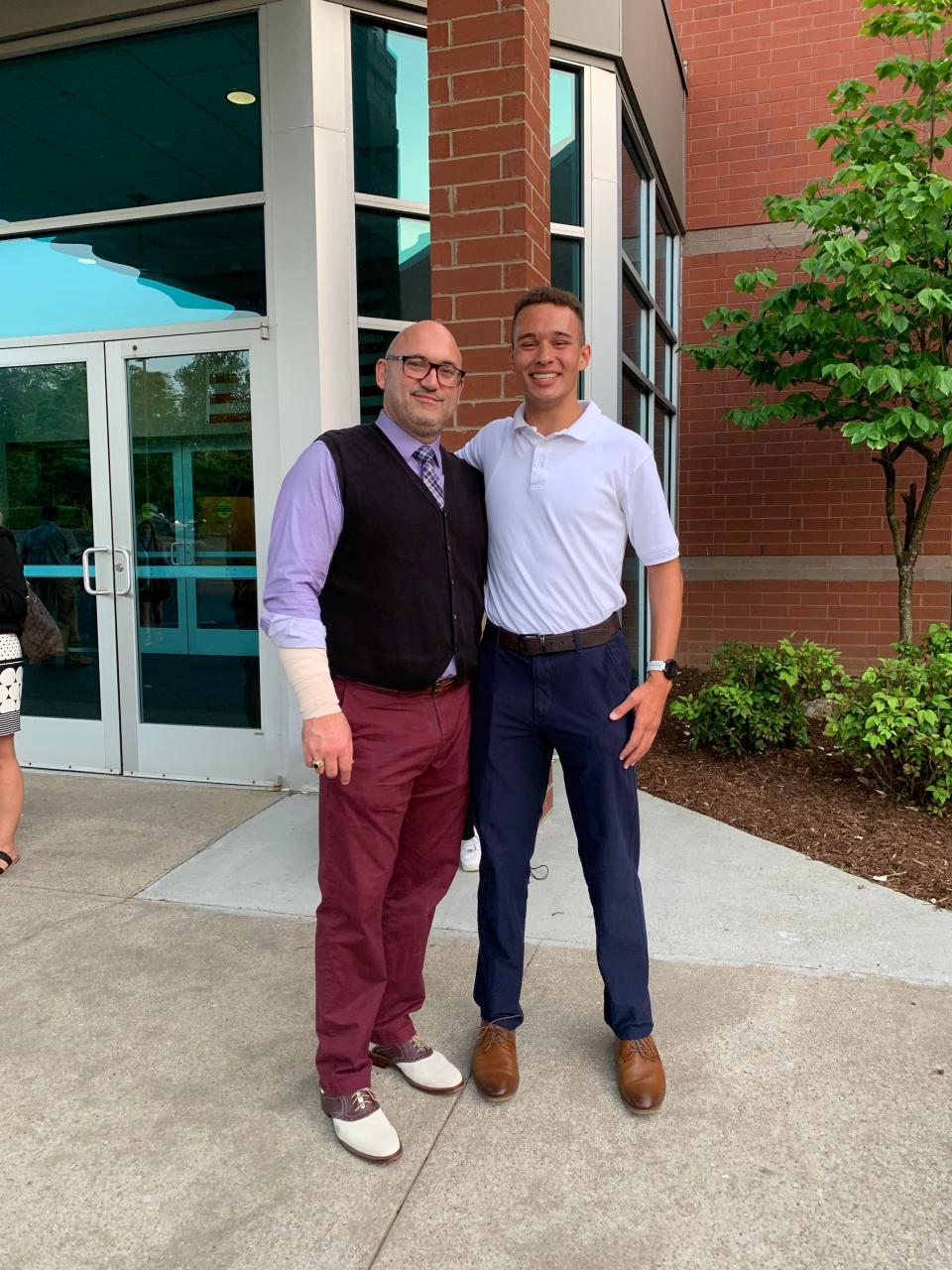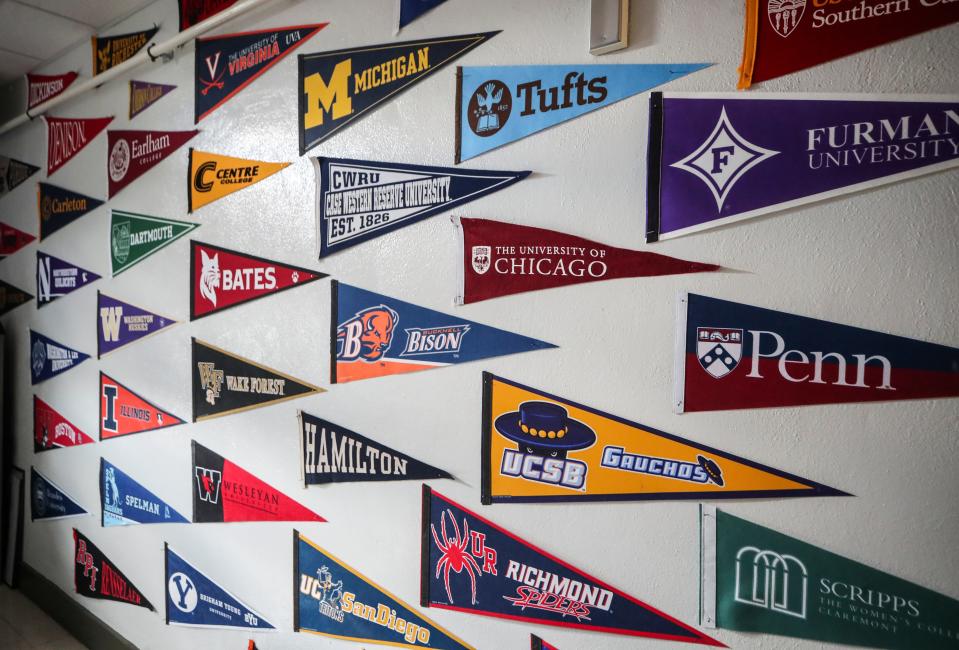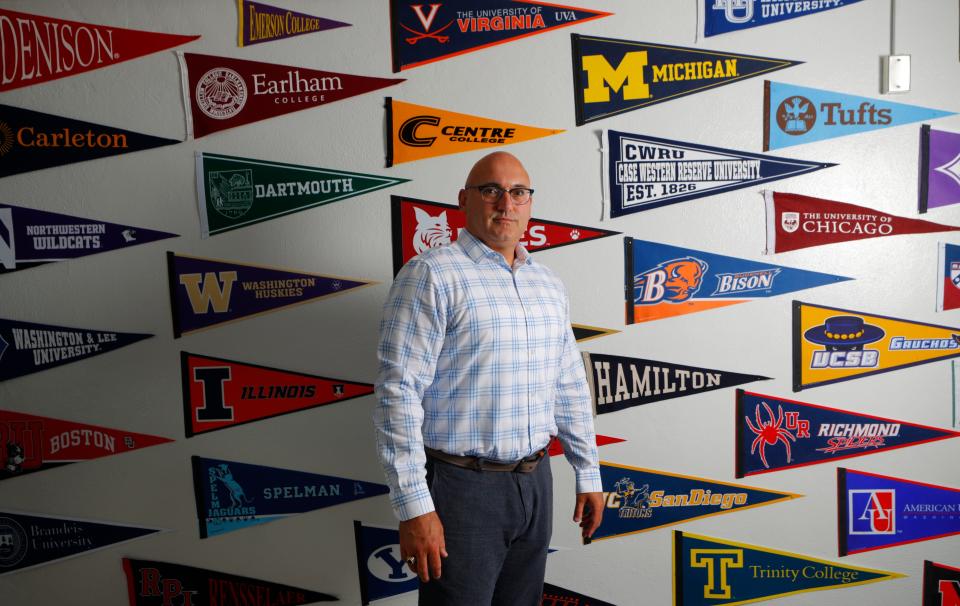'Nerd agent': Fern Creek counselor's program helps students make it in college
For Josh Smith, the imposter syndrome began before he started his engineering classes at Bucknell University.
"It was ridiculous," Smith said of how much he began to worry he didn't belong at the school before he moved to central Pennsylvania - a place he'd never been aside from a campus visit.
Smith is a Fern Creek High graduate whose parents didn't go to college, and he'd never taken an engineering course. He started to question why one of the nation's best undergraduate engineering programs had accepted him - and if they'd end up regretting it.
Smith said he texted Beau Baker, a teacher turned postsecondary guidance counselor who runs Fern Creek's Ivy Plus Academy.
"Mr. Baker told me that's normal, that's part of it," Smith recalled.
But Baker had prepared Smith for college - and how to combat such intrusive thoughts - long before that conversation. For three years at Fern Creek, Smith received tools for college through Ivy Plus – a unique program within Jefferson County Public Schools led by Baker. It helps prospective first-generation students as well as low-income and minority students - three characteristics that tend to make the pursuit of higher education harder.
Smith was the type of student Baker has been working to help at Fern Creek since 2004.
“I started asking seniors what their plans were after high school, and I quickly just realized the lack of information they had was pretty monumental and the limited information they did have was either entirely incorrect or just not real,” Baker said.
For the next decade, he worked on the weekends with students from his English classes who were interested in college, giving them advice about their options and how to make the jump. In 2015, the school’s principal asked what it would take to do that kind of work schoolwide.

Ivy Plus was born, and since then nearly 200 students have gone through the program – which begins their sophomore years. The students have been accepted into about 160 colleges and offered $122 million in scholarships.
And once they've gotten in the door, Ivy Plus graduates have excelled. The program's data shows they are outpacing national ratings in retention (88% compared to 80%) and four-year graduation (84% compared to 63%). Most of the students in the program also are first-generation – a group in which 33% leave college within the first three years.
"These kids are prepared to go to these very academically rigorous institutions, not just make it, but do well," Baker said.
Part of the struggle for young adults who are the first in their families to attend college is the unfamiliarity of it.
If at least one parent went to college, Baker said, students were likely exposed to knowledge related to it. Those students, he said, are more likely to know what a liberal arts school is, for instance, or have some idea of how student loans work.
"There's a lot of foundational information that these students will have going into their junior year, but the Ivy Plus kids don't have any of that stuff," Baker said.

To be accepted into his program, students have to mirror what colleges look for: hard-working, well-rounded students, Baker said. If not first-generation students, they come from economically disadvantaged households or are minorities - groups that are underrepresented on American campuses.
After acceptance, expectations include taking classes in each core subject each year, being involved in extracurriculars, seeking leaderships roles and working diligently to discover who they want to be, not what they want to do.
More: Anxiety after the pandemic? Thousands of JCPS students 'chronically absent' from school
From there, Baker meets with their parents to develop a postsecondary plan and they are exposed to recruiters from dozens of schools across the country. Their college application fees are paid for.
Rudra Vashi, a 2023 Fern Creek graduate, applied to 13 different colleges last year before choosing Trinity University - a school that wasn't on his radar until Baker mentioned it.
He remembered how Baker would tell him that after visiting a campus, he'd know if it was the right one.
"After coming to Trinity, it just clicked," Vashi said. "It felt right. It felt like they wanted me more than the other colleges."
Without Baker's guidance, Vashi said he likely would have gone to a Louisville school because he didn't think an out-of-state school was an option. Applying for so many schools wouldn't have even been an option either if the program didn't pay for the fees, he added.
His first semester at school has been tougher than expected, he said, but Baker's adamant advice that his students take advantage of professors' office hours has paid off.
"Baker really emphasized going to professors' office hours and I don’t think I would have done that otherwise," he said. "That’s helped a lot. I’m building connections."
Baker's philosophy is centered around making sure students find the campus that is the best fit for them, then continuing to support that student through the finish line.
"Everyone knows what a sports agent does – they get you to sign a contract with the best team, for the best amount of money. … I am these kids' nerd agent," Baker said.
Involving families is a major part of the process, as well.
"We put this inordinate amount of pressure on kids to figure out what they want to be," he said, adding that students may be pushed toward becoming doctors or lawyers or toward attending a certain college. "Putting that pressure on young men and women of what they want to do at such a young age prevents them from figuring out who they want to be."
He said he works to change that mindset for his students and their parents so they find the right campus. He brings in recruiters, and the program supports the cost of college visits as well as costs related to getting to campus and being prepared (think new laptop, new suit) for the first day. After they get to college, Baker continues to check in on his former students.
"We are not done providing services to these students until they graduate college," Baker said. "It's not enough to get them out of high school, it's not enough to get them admitted to the University of Chicago. None of that matters unless they graduate."
Another part of the program is bringing Ivy Plus graduates back to Fern Creek to discuss their experiences.
Like Smith, many talk about how it feels to be an imposter, of feeling like "somebody is gonna figure out that you snuck one past the goalie - whether you think you don't belong socially, academically, or all of the above, that someone is going to figure it out," Baker said. "That feeling - we talk about it a lot and talk about how you combat that."
Former students talk about what it's like to be African American on a predominantly white campus, what it's like to identify as LGBTQ in a small rural town, what it's like to be a Kentucky kid.
The goal, Baker said, isn't to scare the students but to "put a hard edge on them."

He tells them: "These colleges have been around for a long time, they don't make mistakes admitting a student, especially if they're going to give as much money as they are giving. They don't make a mistake. You belong there, don't ever make yourself feel like you don't, because that is the only person that can make that happen."
While those lessons couldn't stop Smith's train of thought initially, he said the many other lessons he gained from Ivy Plus helped him pull out of it.
"I learned how to really put myself out there and not shy away from asking questions," Smith said. "I learned how to challenge myself."
In a few days he'll return to Louisville to spend the holidays with his family and to speak to current Ivy Plus students.
Asked what he'll tell them as a sophomore, he said, "Take opportunities, don't be shy. Don't be bashful. Talk to people, make connections, network, study hard but also take time to relax. Have fun. Take opportunities to travel."
Following his own advice led him to meet other students who study together twice a week. In his three semesters at the school, he's studied abroad twice while double majoring in engineering and business.
Where he'd be without Ivy Plus, he said, is something he thinks about "all of the time."
What it takes to run Ivy Plus Academy
For the first eight years Baker ran the program, he worked with about 25 kids a year through Ivy Plus but last year began working with all Fern Creek students on their plans after graduation.
While the school already had guidance counselors who can do this kind of work, Baker said, “they are taxed to the limit – not just here, but districtwide.”
The program aligns with the model of Community-Based College Access Organizations, aside from the fact that those organizations generally start working with students toward the end of their junior years and don’t always include families.
While local colleges often visit each of the district’s high schools, Ivy Plus students met with recruiters from more than 40 colleges last year – because Baker has the time to focus solely on postsecondary options.
All of this comes at a cost, though. The school’s alumni association has donated to Ivy Plus since its inception and more recently an anonymous donor gave “a pretty sizable chunk of money,” Baker said. The Sutherland Foundation also provided a “wonderful” grant to the program.
More: JCPS says it can't currently guarantee transportation to all students next school year
Overall, the program costs $30,000 to $40,000 a year.
Baker said he hopes people will see the achievements of the Ivy Plus students and understand, given the same level of support, many other JCPS students could see that success, too.
“Don’t believe the narrative about public education,” Baker said. “This mindset that the only way you can get a quality education is if you’re in a certain type of high school or you’re in a certain area – it’s just blatantly not true.”
Contact reporter Krista Johnson at kjohnson3@gannett.com.
This article originally appeared on Louisville Courier Journal: Fern Creek counselor's Ivy Plus program puts students on college track
